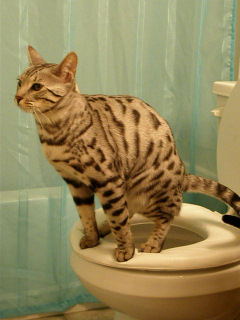Prevent Clogs and Damage: Don't Flush Cat Poop Down Your Toilet - Expert Insights
Prevent Clogs and Damage: Don't Flush Cat Poop Down Your Toilet - Expert Insights
Blog Article
The article author is making a few great pointers regarding Can You Flush Cat Poop Down The Toilet? in general in this great article in the next paragraphs.

Introduction
As feline proprietors, it's essential to be mindful of exactly how we dispose of our feline pals' waste. While it might appear convenient to flush feline poop down the commode, this technique can have detrimental consequences for both the atmosphere and human health.
Alternatives to Flushing
Thankfully, there are much safer and a lot more liable ways to get rid of feline poop. Take into consideration the following alternatives:
1. Scoop and Dispose in Trash
The most typical technique of throwing away feline poop is to scoop it right into an eco-friendly bag and toss it in the garbage. Be sure to use a dedicated litter scoop and get rid of the waste immediately.
2. Usage Biodegradable Litter
Select naturally degradable feline trash made from products such as corn or wheat. These clutters are eco-friendly and can be securely disposed of in the trash.
3. Hide in the Yard
If you have a backyard, take into consideration hiding pet cat waste in a marked location far from veggie yards and water resources. Make sure to dig deep sufficient to stop contamination of groundwater.
4. Set Up a Pet Waste Disposal System
Purchase a pet waste disposal system especially developed for feline waste. These systems utilize enzymes to break down the waste, decreasing odor and ecological impact.
Health Risks
In addition to ecological issues, flushing cat waste can also pose wellness threats to human beings. Pet cat feces might contain Toxoplasma gondii, a parasite that can cause toxoplasmosis-- a possibly extreme disease, particularly for expectant females and people with damaged immune systems.
Environmental Impact
Purging feline poop introduces hazardous pathogens and bloodsuckers into the supply of water, posing a considerable danger to aquatic ecosystems. These impurities can adversely affect marine life and compromise water quality.
Final thought
Responsible pet dog ownership expands beyond giving food and shelter-- it likewise entails proper waste monitoring. By refraining from purging cat poop down the commode and choosing alternate disposal approaches, we can reduce our ecological footprint and shield human health.
Why Can’t I Flush Cat Poop?
It Spreads a Parasite
Cats are frequently infected with a parasite called toxoplasma gondii. The parasite causes an infection called toxoplasmosis. It is usually harmless to cats. The parasite only uses cat poop as a host for its eggs. Otherwise, the cat’s immune system usually keeps the infection at low enough levels to maintain its own health. But it does not stop the develop of eggs. These eggs are tiny and surprisingly tough. They may survive for a year before they begin to grow. But that’s the problem.
Our wastewater system is not designed to deal with toxoplasmosis eggs. Instead, most eggs will flush from your toilet into sewers and wastewater management plants. After the sewage is treated for many other harmful things in it, it is typically released into local rivers, lakes, or oceans. Here, the toxoplasmosis eggs can find new hosts, including starfish, crabs, otters, and many other wildlife. For many, this is a significant risk to their health. Toxoplasmosis can also end up infecting water sources that are important for agriculture, which means our deer, pigs, and sheep can get infected too.
Is There Risk to Humans?
There can be a risk to human life from flushing cat poop down the toilet. If you do so, the parasites from your cat’s poop can end up in shellfish, game animals, or livestock. If this meat is then served raw or undercooked, the people who eat it can get sick.
In fact, according to the CDC, 40 million people in the United States are infected with toxoplasma gondii. They get it from exposure to infected seafood, or from some kind of cat poop contamination, like drinking from a stream that is contaminated or touching anything that has come into contact with cat poop. That includes just cleaning a cat litter box.
Most people who get infected with these parasites will not develop any symptoms. However, for pregnant women or for those with compromised immune systems, the parasite can cause severe health problems.
How to Handle Cat Poop
The best way to handle cat poop is actually to clean the box more often. The eggs that the parasite sheds will not become active until one to five days after the cat poops. That means that if you clean daily, you’re much less likely to come into direct contact with infectious eggs.
That said, always dispose of cat poop in the garbage and not down the toilet. Wash your hands before and after you clean the litter box, and bring the bag of poop right outside to your garbage bins.
https://trenchlesssolutionsusa.com/why-cant-i-flush-cat-poop/

I recently found that review on Can You Flush Cat Poo or Litter Down the Toilet? when doing a search on the internet. Don't hesitate to take the opportunity to promote this entry if you enjoyed it. I am grateful for your time. Visit again soon.
Book Report this page